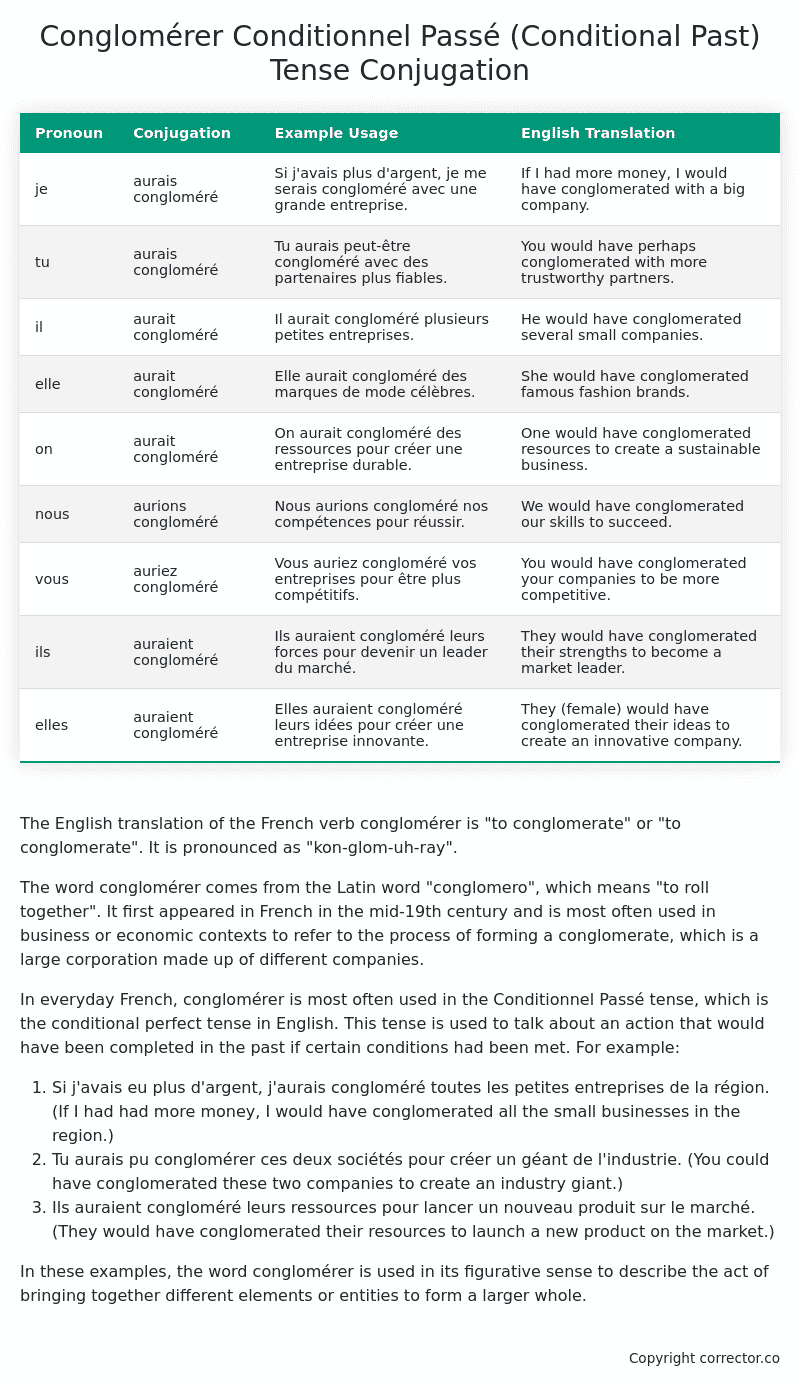Conditionnel Passé (Conditional Past) Tense Conjugation of the French Verb conglomérer
Introduction to the verb conglomérer
The English translation of the French verb conglomérer is “to conglomerate” or “to conglomerate”. It is pronounced as “kon-glom-uh-ray”.
The word conglomérer comes from the Latin word “conglomero”, which means “to roll together”. It first appeared in French in the mid-19th century and is most often used in business or economic contexts to refer to the process of forming a conglomerate, which is a large corporation made up of different companies.
In everyday French, conglomérer is most often used in the Conditionnel Passé tense, which is the conditional perfect tense in English. This tense is used to talk about an action that would have been completed in the past if certain conditions had been met. For example:
- Si j’avais eu plus d’argent, j’aurais congloméré toutes les petites entreprises de la région. (If I had had more money, I would have conglomerated all the small businesses in the region.)
- Tu aurais pu conglomérer ces deux sociétés pour créer un géant de l’industrie. (You could have conglomerated these two companies to create an industry giant.)
- Ils auraient congloméré leurs ressources pour lancer un nouveau produit sur le marché. (They would have conglomerated their resources to launch a new product on the market.)
In these examples, the word conglomérer is used in its figurative sense to describe the act of bringing together different elements or entities to form a larger whole.
Table of the Conditionnel Passé (Conditional Past) Tense Conjugation of conglomérer
| Pronoun | Conjugation | Example Usage | English Translation |
|---|---|---|---|
| je | aurais congloméré | Si j’avais plus d’argent, je me serais congloméré avec une grande entreprise. | If I had more money, I would have conglomerated with a big company. |
| tu | aurais congloméré | Tu aurais peut-être congloméré avec des partenaires plus fiables. | You would have perhaps conglomerated with more trustworthy partners. |
| il | aurait congloméré | Il aurait congloméré plusieurs petites entreprises. | He would have conglomerated several small companies. |
| elle | aurait congloméré | Elle aurait congloméré des marques de mode célèbres. | She would have conglomerated famous fashion brands. |
| on | aurait congloméré | On aurait congloméré des ressources pour créer une entreprise durable. | One would have conglomerated resources to create a sustainable business. |
| nous | aurions congloméré | Nous aurions congloméré nos compétences pour réussir. | We would have conglomerated our skills to succeed. |
| vous | auriez congloméré | Vous auriez congloméré vos entreprises pour être plus compétitifs. | You would have conglomerated your companies to be more competitive. |
| ils | auraient congloméré | Ils auraient congloméré leurs forces pour devenir un leader du marché. | They would have conglomerated their strengths to become a market leader. |
| elles | auraient congloméré | Elles auraient congloméré leurs idées pour créer une entreprise innovante. | They (female) would have conglomerated their ideas to create an innovative company. |
Other Conjugations for Conglomérer.
Le Present (Present Tense) Conjugation of the French Verb conglomérer
Imparfait (Imperfect) Tense Conjugation of the French Verb conglomérer
Passé Simple (Simple Past) Tense Conjugation of the French Verb conglomérer
Passé Composé (Present Perfect) Tense Conjugation of the French Verb conglomérer
Futur Simple (Simple Future) Tense Conjugation of the French Verb conglomérer
Futur Proche (Near Future) Tense Conjugation of the French Verb conglomérer
Plus-que-parfait (Pluperfect) Tense Conjugation of the French Verb conglomérer
Passé Antérieur (Past Anterior) Tense Conjugation of the French Verb conglomérer
Futur Antérieur (Future Anterior) Tense Conjugation of the French Verb conglomérer
Subjonctif Présent (Subjunctive Present) Tense Conjugation of the French Verb conglomérer
Subjonctif Passé (Subjunctive Past) Tense Conjugation of the French Verb conglomérer
Subjonctif Imparfait (Subjunctive Imperfect) Tense Conjugation of the French Verb conglomérer
Conditionnel Présent (Conditional Present) Tense Conjugation of the French Verb conglomérer
Conditionnel Passé (Conditional Past) Tense Conjugation of the French Verb conglomérer (this article)
L’impératif Présent (Imperative Present) Tense Conjugation of the French Verb conglomérer
L’infinitif Présent (Infinitive Present) Tense Conjugation of the French Verb conglomérer
Struggling with French verbs or the language in general? Why not use our free French Grammar Checker – no registration required!
Get a FREE Download Study Sheet of this Conjugation 🔥
Simply right click the image below, click “save image” and get your free reference for the conglomérer Conditionnel Passé tense conjugation!

Conglomérer – About the French Conditionnel Passé (Conditional Past) Tense
Formation
Common Everyday Usage Patterns
Expressing Unreal Past Scenarios
Polite Requests or Suggestions
Expressing Doubt or Uncertainty
Interactions with Other Tenses
Conditional Present
Indicative Past Tenses
Conditional Future
Summary
Want More?
I hope you enjoyed this article on the verb conglomérer. Still in a learning mood? Check out another TOTALLY random French verb conjugation!


